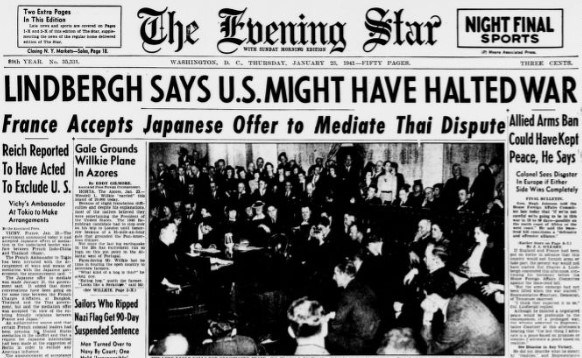World War II Chronicle: January 23, 1941
Click here for TODAY’S NEWSPAPER
Charles Lindbergh’s 1927 transatlantic flight made him a national hero, but his neutral and isolationist stance in 1941 would tarnish his image and keep him from serving in uniform during World War II. On Jan. 22, Col. Lindbergh told the House Foreign Affairs Committee that he sought a negotiated peace between Nazi Germany and Great Britain. While that sounds like appeasement, and we are not trying to exonerate Lindbergh or justify his position, the Chronicle helps put us better understand his viewpoint by considering what people knew that day, disregarding the hindsight we have 80 years later.
As we see on the front page, when asked if victory would be possible, Lindbergh said “It’s possible, but improbable.”
We know now that our meager peacetime military and Naval forces would swell to more than 16 million men, but when Lindbergh appeared before Congress, 18 nations had larger armed forces than ours. The initial round of draftees — the first peacetime draft in U.S. history — had only began training in November and our military strength in January 1941 put us roughly on par with modern-day Morocco. But it is also important to consider that the article lists Germany, Italy, Japan, and Russia as potential enemies.
Isolationism and neutrality may sound unpatriotic now, but consider that not even 30 years after sending millions of Americans overseas to fight a European war, the Europeans were right back at it again. Like the America First Committee slogan goes: “England will fight to the last American” (Lindbergh was an America First spokesman). A second world war might require sending tens of millions more Americans than the first one, which isn’t what a father, physically and emotionally scarred from the “Great War,” would want for his son. It would be five years (at current production rates) before we could field a “two-ocean navy.” And, despite the Great Depression, Washington is already wanting to spend piles of hard-earned taxpayer dollars on a European problem.
Imagine how different things would look had Nazi Germany and Imperial Japan just consolidated their new territories and not declared war against the United States. Hitler could have saved millions of his best soldiers from a frozen doom in Russia, and the guns of well over 100 Soviet divisions would be deterring us instead of killing their former allies. Given Hitler’s ideology and writings, you could make the case that war between Germany and the Soviet Union was inevitable. But no one sitting in that committee chamber knew that in a few months, German troops would invade the Soviet Union (or that the Führer had in fact already directed his commanders to begin preparations). Instead, the Axis killed one of their strongest political advantages: American isolationism and neutrality. Instead of two massive armies pointing their guns at America as they divided Europe between them, the Wehrmacht and Red Army would bleed each other white. And millions of formerly isolationist Americans men ran to the recruiting office, armed with the moral clarity of a fight between good and evil.
It’s easy for anyone alive today to view American naval, air, and military supremacy as if it were a birthright, but Charles Lindbergh had toured Nazi Germany and knew their warplanes were more advanced than ours. Given our industrial and manpower potential, a person in 1941 would see that we could theoretically mobilize 10 million men from our current peacetime force — and build the shipping necessary to transport them across the Atlantic and Pacific. But there were a lot of other factors to consider. Axis forces already had plenty of combat experience. Germany’s blitzkrieg tactics made quick work of a mighty France. We would need better planes, better ships, better armor, lots of everything, and fast.
The United States undoubtedly had tremendous industrial capacity and two oceans protected our factories from enemy bombers. But Lend-Lease was still hotly debated, and would be for months to come. We had yet to emerge from the Great Depression and become the Arsenal of Democracy. Also consider that the potential to build tanks, planes, and trucks is one thing; getting them safely across U-boat infested waters is another.
There was simply no way of knowing on Jan. 23, 1941, in a largely still-isolationist United States would produce a war machine that was innovative, adaptive, efficient, and highly effective; that we would do so many things right and our enemies would do so many things wrong. That considered, Lindbergh’s comments may seem a little less like carrying water for the Nazis and more grounded in the geopolitical reality they faced.
Sports section begins on page 39
Evening star. (Washington, D.C.), 23 January 1941. Chronicling America: Historic American Newspapers. Lib. of Congress.
https://chroniclingamerica.loc.gov/lccn/sn83045462/1941-01-23/ed-1/
